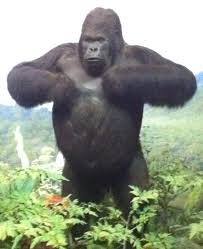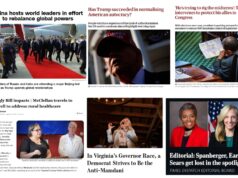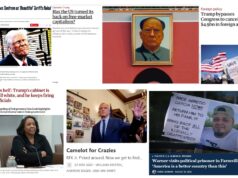 The main event of our Reunion was a big banquet, which consisted mostly of wonderful schmooze time and dining time. Then came the program time, which I found less wonderful because of what our MC threw in.
The main event of our Reunion was a big banquet, which consisted mostly of wonderful schmooze time and dining time. Then came the program time, which I found less wonderful because of what our MC threw in.
The MC was our class president. He’d been our class’s most outstanding athlete, and he stood out also back in the day for driving a fancy Chrysler 300 to school. He has a reputation for being a pretty good guy. And he’s also a Republican.
That Republican bit should be irrelevant. Had I been the MC, it surely would have been irrelevant to the job I’d have done that I’ve spent my last nine years alarmed and disgusted by what the Republican Party has become. I’d have figured that that had nothing to do with what brought us classmates together, a half century after graduation. I’d have thought it contrary to our feel-good purposes to intrude any views of mine on matters that divide us.
But as it turned out, it wasn’t irrelevant. For whatever reason, our star quarterback thought himself entitled to compel us all to join him in his brand of patriotism. It’s a brand I recognize, and it’s not one I like.
He did it in three distinct moves, over about a fifteen minute period, mixed in with thanks to the rest of the reunion committee, a bit of reminiscence, and a series of jokes (with a misogynistic theme running through them).
The first move was to make the declaration, with no particular context, that “we live in the greatest country in the history of the world.” It’s a statement that was truer the day we marched out of the gymnasium to “Pomp and Circumstance” than it is now. But one then less frequently announced.
Since then, while we continue to lead the world in military spending and power, and have surged to a lead in percentage of our people behind bars, our nation has fallen well back in the standings in various measures of human well-being-like in health, life expectancy, infant mortality, educational achievement, and social mobility.
The kicker is this: the same Republican force that’s pumped up the “We’re # 1” mentality has been key to making our country notably less great by the values both of our founders and our religious traditions.
Our class president’s remark connected into all that chest-thumping, jingoistic sense of national superiority that our most recent Republican president used in order to get and maintain support for the kinds of aggressive American policies that made our traditional friends abroad fear and distrust us.
His next move, a while later, was to ask for all our classmates who’d served in the American armed forces to stand up and to tell the rest of us to applaud them. I appreciate people’s service in the military, and I know that some of these guys from the class of ’63 put their lives on the line forty-some years ago. But did this gesture toward the military have a place in our event?
And, so many years later, and with people now at the age of retirement from long careers, is the service and sacrifice of soldiers the only kind worthy of appreciation?
What about the teachers in the room, who worked long hours for not much pay out of devotion to their students? And doctors and nurses, working hard to cure the sick? And what about my friend Marv, sitting at our table, who’d brought integrity and sagacity to a domain of the law, helping thereby to make our society a bit more just and more sane?
This extraneous call for us to applaud our soldiers, and only our soldiers, also rang a familiar note: the militarization of virtue, promoted by that same Republican presidency, as a way of making our raw power the definition of our national greatness, as well as putting the misguided wars of choice beyond challenge by tying them to “our heroes” in uniform.
Finally, as our MC was about to wrap things up, he called upon us all to stand and recite — as I do not recall our doing during our years together in high school – the “Pledge of Allegiance” to the flag. I used to have fond feelings for the American flag, but in our times it’s become so completely connected with the kind of patriotism that’s been called “the last refuge of scoundrels” that it’ll be quite a while before I can see it again as standing for the Republic that offers “liberty and justice for all.”
As a candidate for Congress, I refused to be one of those politicians who have been intimidated by this ugly form of patriotism into wearing a flag pin, or using the flag in my campaign hand-outs. I preferred to talk about the values that animated our Founders. Not the tarnished symbol, but the living substance.
Any one of these gestures, I might have overlooked. But together, they form a pattern. At some level our master of ceremonies must have known that he was pushing onto all of us a position on a matter of political controversy in our country. This pattern, after all, takes clear sides in what was one of the chief recent political battle lines in America.
This is a pattern we’ve seen before at important moments of the history of the past century: the sense of superiority, the militarism, and the idolatry over the flag. We’ve seen it in our own recent history, and we’ve seen it in chapters of the history of other nations.
They are always dark chapters.
Our reunion did not need that ugly bit of contemporary Republicanness intruding into our event.














